|
|
|
Sort Order |
|
|
|
Items / Page
|
|
|
|
|
|
|
| Srl | Item |
| 1 |
ID:
133755
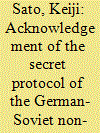

|
|
|
|
|
| Publication |
2014.
|
| Summary/Abstract |
In June 1989, the First Congress of People's Deputies of the Soviet Union established the Commission for Historical and Legal Estimation of the Soviet-German Non-aggression Pact of 1939. In the commission, representatives from Estonia, Latvia and Lithuania condemned the Soviet annexation of the Baltic States, prompting heated arguments regarding the invalidity of the related secret protocol of the pact with other members who continued to hold the traditional Soviet ideological view of the pact as something positive. The debate over the secret protocol had the further potential to extend to disputes over 'recovery of lost territory' amongst the Baltic States, Ukraine, Moldova, Belarus and Russia. This article analyses the arguments used by commission members, considering the interplay of national interests, how they balanced arguments between restoration of 'state sovereignty' and maintenance of borders, and how they finally compromised and concluded the commission's report.
|
|
|
|
|
|
|
|
|
|
|
|
|
|
|
|
| 2 |
ID:
128987
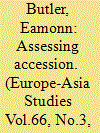

|
|
|
|
|
| Publication |
2014.
|
| Summary/Abstract |
On 1 May 2014, the European Union (EU) celebrated the tenth anniversary of the accession of ten member states-Cyprus, Czech Republic, Estonia, Hungary, Latvia, Lithuania, Malta, Poland, Slovakia and Slovenia. Of these ten new members, eight were Central and East European (CEE) countries that had, for most of the twentieth century, been governed by communist regimes either as republics of the Soviet Union (Latvia, Lithuania and Estonia), satellite states of the Soviet Union (Poland, Hungary, Czech Republic, Slovakia) or as a constituent republic of Yugoslavia (Slovenia). In the subsequent ten years three additional post-communist countries have acceded to the EU (Romania and Bulgaria in 2007 and Croatia in 2013). Commenting on the 2004 EU accession of the first eight former communist countries, the then Irish Prime Minister and President of the European Council, Bertie Ahern, wrote that there was
a particular historical resonance as eight of the former communist countries in the east have emerged from the shadows of the Iron Curtain to join us in working for common goals and for mutual benefit. The artificial divisions, which have blighted our continent's history for so long, are finally being laid to rest.1
|
|
|
|
|
|
|
|
|
|
|
|
|
|
|
|
| 3 |
ID:
016554
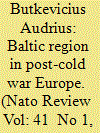

|
|
|
|
|
| Publication |
Feb 1993.
|
| Description |
7-11
|
|
|
|
|
|
|
|
|
|
|
|
|
|
|
|
| 4 |
ID:
147288
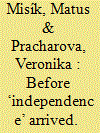

|
|
|
|
|
| Summary/Abstract |
This paper analyses energy relations concerning natural gas between Lithuania and Russia. Contrary to the existing literature, which stresses Lithuanian energy dependence, this paper argues that there had been interdependence between the two countries even before Lithuania underwent diversification at the end of 2014. The paper develops an analytical framework that examines: (a) physical energy relations, (b) the dominance of the energy agenda in mutual relations, and (c) the influence of the European Union. The analysis shows that while Lithuania was dependent on Russian supplies of natural gas, Russia was also dependent on Lithuania as a transit country of gas to Kaliningrad, a Russian enclave. Although Russia has shown a much higher willingness to employ an energy weapon than Lithuania, its efforts to exercise pressure on Lithuania have been negatively affected by the Baltic state’s position as a transit country. The European Union has played a crucial role as its pre-accession requirements and internal energy market rules have significantly influenced the energy relationship between the two countries.
|
|
|
|
|
|
|
|
|
|
|
|
|
|
|
|
| 5 |
ID:
106284
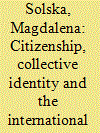

|
|
|
| 6 |
ID:
130893
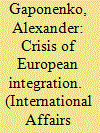

|
|
|
|
|
| Publication |
2014.
|
| Summary/Abstract |
AFTER THE USSR'S COLLAPSE, the Baltic states came under the political influence of the US and the economic influence of the European Union. This influence was used by their new geopolitical "curators" to initiate an anti-Russian line in both the foreign and domestic policies of Latvia, Lithuania and Estonia, as well as to break their economic ties with Russia. At present, the only significant economic ties that Russia still has with the Baltic countries are in the energy sector. It's the supply of natural gas through the pipeline and distribution systems with the use of the Incukalns underground storage facility. It's also the supply of Russian electricity and rail deliveries of hydrocarbons via the Ventspils and Klaipeda ports.
|
|
|
|
|
|
|
|
|
|
|
|
|
|
|
|
| 7 |
ID:
093677
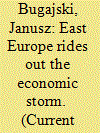

|
|
|
|
|
| Publication |
2010.
|
| Summary/Abstract |
Predictions of massive social unrest, political breakdown, or reformist reversals have, to date anyway, proved misplaced.
|
|
|
|
|
|
|
|
|
|
|
|
|
|
|
|
| 8 |
ID:
131157
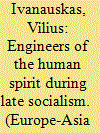

|
|
|
|
|
| Publication |
2014.
|
| Summary/Abstract |
Writers were among the most publicly recognised intellectuals in the USSR. They actively participated in indoctrination practices that reflected strict mechanisms of control and censorship and provided prestige and authority in society. This article analyses how local writers in Lithuania who were part of the establishment during late socialism developed a multi-faceted relationship with the system. The perspective of different generations reveals the rise of ethnic (local) interests and the disconnection of everyday life from official goals. It also shows that writers who worked in official channels reduced their participation in indoctrination processes and significantly influenced the mobilisation of national identity.
|
|
|
|
|
|
|
|
|
|
|
|
|
|
|
|
| 9 |
ID:
073645
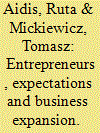

|
|
|
|
|
| Publication |
2006.
|
| Summary/Abstract |
This article applies a multinomial logit estimator to investigate which factors affect SME owners' expectations to grow their businesses in Lithuania. Our findings provide evidence that SME owners' human capital (education) matters and that growth expectations are positively related to exporting. In addition, we analyse the link between the perceptions of business constraints and growth expectations and find that the factors, which are perceived as main business barriers, are not necessarily those which are associated with reduced growth expectations. However, perceptions of corruption seem to affect growth expectations the most.
|
|
|
|
|
|
|
|
|
|
|
|
|
|
|
|
| 10 |
ID:
053417
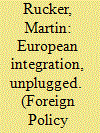

|
|
|
|
|
| Publication |
Sep-Oct 2004.
|
|
|
|
|
|
|
|
|
|
|
|
|
|
|
|
| 11 |
ID:
093724
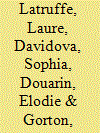

|
|
|
|
|
| Publication |
2010.
|
| Summary/Abstract |
The impact of the introduction of EU Single Area Payments (SAPs) on farm expansion strategy in Lithuania is investigated, utilising farm accounting and survey data. The introduction of the SAP has a positive influence on farmers' intentions to expand their area compared to a baseline scenario of the hypothetical continuation of pre-accession policy. The switch in policy has a more pronounced effect on farms that were previously credit constrained. While the SAP has been presented as a support that is decoupled from production, its introduction may have ex post coupled effects, through an income multiplier effect on credit constrained farmers.
|
|
|
|
|
|
|
|
|
|
|
|
|
|
|
|
| 12 |
ID:
174390
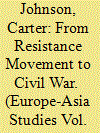

|
|
|
|
|
| Summary/Abstract |
This article compares resistance movements along the western borderlands of the Soviet Union between 1944 and 1952. Despite similar levels of state repression and local grievances, Moldova’s opposition movement did not escalate to the level of civil war, whereas civil wars emerged across the Baltic states, Belarus, and Ukraine. Through theory development and testing, the article compares Lithuania and Moldova, identifying the role of previous regime behaviour, the speed of Soviet takeover, and the availability of safe havens within Moldova and Lithuania as the key causal factors explaining the difference.
|
|
|
|
|
|
|
|
|
|
|
|
|
|
|
|
| 13 |
ID:
049740
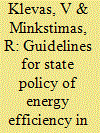

|
|
|
|
|
| Summary/Abstract |
This paper analyses a problem, which exist not only in Lithuania but also in most Central and East European countries. Energy intensity is at such high level that it causes financial difficulties nearly in all branches of energy. Resilient interaction between energy sector and economics define the fact that disproportions between energy sector and economics hinder the development of economics. Analysis focusing on proportions between various energy sectors and economies was carried out. These proportions expressed in a set of well-known energy-economic indexes in comparison with similar proportions of other countries revealed the primary reasons of the financial difficulties in energy sector, as well its macroeconomic impact. Concept of state energy conservation policy is presented which can evaluate links between energy and economics according to its proportions. Conditions for successful mastering of renewable energy resources are analysed and state operation mechanism is proposed.
|
|
|
|
|
|
|
|
|
|
|
|
|
|
|
|
| 14 |
ID:
109835
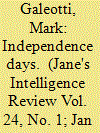

|
|
|
| 15 |
ID:
086552
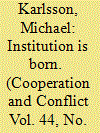

|
|
|
|
|
| Publication |
2009.
|
| Summary/Abstract |
Lithuania's formation of a counter-terrorism institution after 9/11 sheds new light on three premises often associated with the study of institutional formation. First, while the distinction between the creation phase and the operation phase is logical, the appearance of extra-institutional guidance suggests that established institutions within other domains (e.g. military security) can temporarily fill an institutional vacuum (counter-terrorism). Second, the dynamic between agency and structure is readily seen, but in this case it was quite clear that agency was strongly dependent upon changes in some of the structural contexts (threat of terrorism, international institutions, age of the security state). Third, the role of sequencing and timing turned out to be more important than expected. There was a strong temporal order between the sequences of the formation phase and a significant spillover from two contemporary security processes (preparations for NATO membership, reforms of the security state).
|
|
|
|
|
|
|
|
|
|
|
|
|
|
|
|
| 16 |
ID:
162237
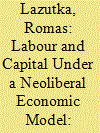

|
|
|
|
|
| Summary/Abstract |
This study investigates the split of national income between labour and capital in Lithuania and its distributional implications. It shows that the neoliberal economic development model embraced by Lithuania since regaining independence in 1991 produced significant economic growth. However, this growth was based on suppressing wages, keeping taxes on capital low and exporting cheap labour to the core EU countries. This resulted in high inequalities in income and wealth that have contributed to a deep socio-demographic crisis in the country. It is argued that in order to make Lithuanian capitalism socially sustainable, the neoliberal model of development needs to be reconsidered and modified.
|
|
|
|
|
|
|
|
|
|
|
|
|
|
|
|
| 17 |
ID:
130850
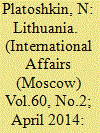

|
|
|
|
|
| Publication |
2014.
|
| Summary/Abstract |
In November 2013, Ukraine and several other former Soviet Republics declined and association with the European Union at the Vilnius Summit of Eastern Partnership.
|
|
|
|
|
|
|
|
|
|
|
|
|
|
|
|
| 18 |
ID:
109005
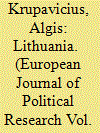

|
|
|
| 19 |
ID:
100100
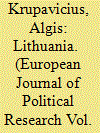

|
|
|
| 20 |
ID:
189793
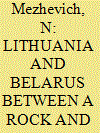

|
|
|
|
|
| Summary/Abstract |
THE marking of a full 30 years of the post-Soviet space, which coincided with a severe global economic crisis and the Special Military Operation in Ukraine, are reason enough to revisit the question of what has happened along Russia's Western borders. Since the early 1990s, the Russian expert community has adopted the Western paradigm of assessing transformation processes as a single model that can be applied at the very least from Tallinn to Chisinau, and at most from Vilnius to Dushanbe. It did not immediately become clear that in analyzing macroeconomic indicators, Western experts "tend to think globally or in regional terms, while studies of national specifics are few and far between, but this is precisely where the devil is."
|
|
|
|
|
|
|
|
|
|
|
|
|
|
|
|
|
|
|
|
|